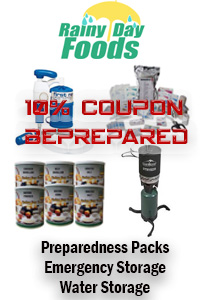By James.
There are some essential things you should know about how to survive in the outdoors. While this list isn’t intended to be a complete outdoor survival guide it does highlight the most important considerations to make anytime you head into the wilderness.
Essential Outdoor Survival Tips
The most important survival tip is survival preparedness. Without proper preparation both in terms of knowledge and equipment your chances of surviving in the wilderness are diminished considerably.
- Always tell a friend where you’ll be going, how long you expect to be gone, and what to do if they don’t hear from you. Realistically a lot of people will head out “just for a few hours” and feel like they don’t need to tell anyone. In most situations things end up fine but think about what would happen if you got lost, injured, sick, etc. At the very least leave a note where someone will find it by the end of the day if you can’t be bothered to contact someone.
- Know the hazards of the area you’ll be in. Are there dangerous animals? Is it subject to flooding? Call a ranger or talk to local people.
- Take the time to bring a map and study any landmarks. Even power lines and dirt roads can be useful in orienteering yourself if you know which direction they run from the map.
- Having a compass is useless if you don’t know how to use one. Practice using a map in a safe area outdoors before heading into the wilderness.
- Avoid stagnant water and try to find cold moving water that looks clear instead. The best is of course to treat with iodine, boil it, or bring your own water.
- If you have to start eating berries or plants start by rubbing it against the skin and waiting. If there’s no reaction after a few hours rub it against the lips. Wait a few hours again. Then lick, wait, eat a small amount, wait, and finally eat a serving. There are some exceptions though like poison ivy that can take days to show up so avoid eating plant matter unless you have to or know it’s safe.
- Meat obtained from other mammals (rabbits, squirrels) is usually safe to eat but cook thoroughly. There are very few poisonous mammals. Avoid reptiles and plants though unless you know it’s safe.
- Urine can be drunk only once or twice before it becomes toxic.
- Make sure your compass is adjusted for magnetic or true north and latitude. The further away from the equator the more important an accurate latitude adjustment becomes.
- Bring a few trash bags with you in your backpack or even pockets. They make excellent rain protection over clothes or rain proof containers for maps, food, etc. You can also use them for outdoor survival shelter against rain and the sun.
- Put together an outdoor survival kit to bring with you whenever you head out into the wilderness. Customize it based on your needs in the specific environment you’ll be in.
- Most animals want to avoid you even more than you want to avoid them. Dragging a stick, singing, or otherwise making noise to alert animals you’re there is a good idea.
- Keep your clothes and supplies dry. Nothing makes your situation more dire than wet socks and shoes, soaked clothing, or a ruined map.
- Never get yourself into a situation with equipment, electronics, etc that you can’t get yourself out of without them. Bring spares or know another way back or out.
- Bring matches and lighters. Lighters resist water well (and can be dried and still work) but can break. Matches are easily ruined by water but will stand up to a lot of punishment.
- Stock your survival/first aid kit with drugs including prescription ones. Ask your doctor for a single shot of epinephrine for allergic reactions, a weeks supply of antibiotics in case of injuries that might get infected, etc. Most doctors will be willing to give you a small supply of these drugs if you explain their emergency wilderness use.
- If you’re going to try to trap animals (unlikely without experience) be aware that your scent is a huge red flag to them. Let snares or traps sit in the smoke from a fire to mask your scent after construction and take care when setting them to not stink up the place.
- Animals tend to travel in well worn routes throughout an area. Set snares or traps along these routes and “close in” the trail to make it focus on your trap. Take the time to locate one of these trails or you’re wasting your time.
- Go outdoors with a group or at least one other person. Being alone in the outdoors when something goes wrong makes everything much more difficult and serious.
- When you’re on a trail make sure you look back occasionally so you know what things will look like on your way back. Sometimes forks in the trail won’t even be visible when you’re coming from one direction and will cause quite a bit of confusion on your way back.
- Learn how to make a fire the right way to avoid wasted energy and resources. Don’t rely on being able to make a fire without matches or a lighter when you’re going into a possible survival situation.
- While plastic bags are great and especially useful for storing things that can’t get wet a space blanket provides thermal insulation making it a superior shelter and often times is reflective making it useful for signaling.
- To signal an aircraft or a person, make an L with the index finger and thumb. Use your light or reflective material to shine against your hand where the index finger and thumb meet. Now “aim” at the place you want to signal placing it where your thumb and index finger meet but still visible. Now shine the light back and forth from your hand to the object. This will create a flashing effect and make sure you’re shining in the correct place.
- If you ever get lost while out with a group don’t stray too far. Search parties will find out which path your group took and be looking for you near the path. If you wander away your chances of being found get smaller and smaller. Only try to find your way out if you know where you are and which direction will lead you to civilization.
- Use common sense in all your planning, preparation, and execution. Double check all essential supplies and plans. The less you leave the chance the less things can go wrong.
James Kearney writes for DoomsdayNews. An online magazine that focuses on preparedness, survival, self-reliance and topical mainstream news.









5 comments
1 pings
Skip to comment form
Pretty good tips, although I think there is an over the top amount of attention spent on getting food, most of us can get along for quite some time without food, water and shelter being the most important- water so we do not become dehydrated and shelter to maintain our body temperature. Too much valuable energy is wasted trying to secure food, IMO.
Author
I too put water and shelter near the top of the list, although food is definitely of utmost importance.
Something I would like ot mention on this topic: Basic land navigation skills can go a long way towards getting you unlost. Knowing relatively simple things, such as sighting landmarks, noting your back trail when hiking (things look different going the other way) and being able to orient yourself by stars are, in my opinion, very important and often overlooked skills sets. Granted, we have compasses and GPS systems now, but they can break or get lost.
The eating berries tip is priceless. Gives me hope opposed to just keeling over from poison.
In relation to berry eating, I was taught to look for signs that animals or birds fed off of them. If you find ripe berries that dont liook picked on by wildlife, dont take the chance.
[…] 25 Essential Outdoor Survival Tips – Prepper-Resources.com […]